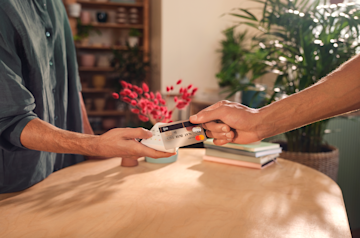
How to have a more sustainable summer
From downsizing our living spaces to limiting our consumption, many of us are trying to live a more sustainable lifestyle
7 min read
If you’ve been trying to reduce your carbon footprint this year, you’re not alone. From downsizing our living spaces to limiting our consumption, many of us are trying to live a more sustainable lifestyle, one step at a time. Enter: summer — a time for traveling, trend-setting, and trying to keep cool. And despite our best efforts, it can also be a time where our sustainability goals are pushed to the side in favor of short-haul flights and must-have summer clothes. However, there are actually plenty of ways to stay sustainable this summer while still having the time of your life. Read on to learn how. With each summer getting hotter, it’s no wonder that more and more Europeans are purchasing air conditioners to survive the summer months. However, ACs use more electricity than any other home appliance. That means they emit harmful greenhouse gasses that, in turn, make our planet even hotter. So, what can you do to stay cool in the hottest months of the summer? You might be surprised: There are several at-home hacks that can keep you and your living space cool. If you have thick curtains, keep them closed during the day to block out the sun, and then sleep with open windows at night to let the cool air in. Take cold showers in the morning and evening, or press a cold washcloth to your wrists and the back of your neck to regulate your body temperature. Go for a swim whenever you can, and drink plenty of water. If you’re looking to explore the European continent this summer, there’s no better way than to ride the rails. Statistics show that car travel is responsible for more than 70% of total transportation emissions, with air travel making up around 13%. Train travel, on the other hand, makes up just .4% of greenhouse gas emissions. It’s mainly powered by electricity, making it significantly more sustainable. But train travel offers tons of other benefits, too. You’ll avoid stressful traffic jams or road construction, and get to soak in exceptional views. Train stations are generally in the city center, meaning you won’t have to venture out to an airport. Plus, train cars are spacious, making them great for traveling with kids. Summer is the perfect time to head to the farmer’s market to stock up on fresh produce, especially when it’s locally grown. Whether you’re in Italy or Croatia where zucchini, tomatoes, and peaches are plentiful, or in Germany where everyone goes wild for Beelitz asparagus and strawberries, almost every region of Europe offers its share of local delicacies. Locally grown food tastes better, and it’s also much better for the environment. Shipping produce across countries — or continents — increases greenhouse gas emissions, and makes food lose some of its nutritional quality. Skipping the grocery store and shopping at a local farmer’s market is a more sensory experience, which helps you spend more mindfully. Plus, local shopping puts money back into your community, supporting regional farmers, boosting job growth, and supporting biodiversity. Plastic is everywhere, and it’s doing immeasurable harm to our planet. Why? Well, for starters, producing and recycling plastic requires a tremendous amount of energy and fossil fuels, which heat up the ozone layer and raise the temperature of our planet. When plastic isn’t recycled, it gets incinerated, emitting harmful fumes and greenhouse gasses into the atmosphere. And then there’s plastic waste, which pollutes our landfills and oceans, endangering wildlife and biodiversity. As bleak as this may sound, there are plenty of ways to reduce your own plastic intake this summer. Start reducing your single-use plastic intake by carrying a reusable water bottle, coffee cup, shopping bag, or takeaway lunchbox. When you’re purchasing products like kitchen utensils, opt for wood, glass, or bamboo alternatives to plastic. When it comes to food purchases, avoid produce, dairy, or grains packaged in plastic or buy them in bulk. Lastly, whether it’s kid’s toys or storage containers, reuse or donate whatever plastic you can — you’ll help the environment while helping others too. We all love looking our best for the summer, but sometimes staying on-trend can come with a high cost. According to the UN, the fast-fashion industry — where clothing is produced cheaply and at a large scale, worn a few times or not at all, and then quickly disposed of — is responsible for between two and eight percent of global carbon emissions, and is the second largest consumer of water. What’s more, mass-produced clothing is often made of synthetic fabrics, which pump plastic particles into our oceans and drinking water. The good news? You can get great new-to-you items to complete your summer wardrobe by shopping second-hand. Head to your local flea market, do a “frock swap” with friends, or shop used items online. You’ll likely find higher quality clothes at lower prices — plus, impress your pals with your unique finds. If you’re dreaming of mastering the art of gardening, we’ve got good news: Planting flowers is as good for the environment as it is for your personal wellbeing. Flowers play an important role in soil conservation by putting nutrients back into the ground, and global wildlife thrive when local buds are blooming. But more importantly, pollinators such as bees, butterflies, and hummingbirds feast on the nectar of flowers. These winged wonders then go on to pollinate 80% of the world’s crops, ensuring that our food, soil, and air is healthy and thriving. And, the good news is that you don’t need acres of land to plant a garden of your own! Set up a small backyard garden, or populate your window box with flowers native to your region. You’ll help the pollinators do their work, and improve your view as well. Did you know that 17% of global food production goes to waste? Whether it’s overripe tomatoes or cheese that’s gone bad, our culture has become accustomed to throwing out food at an embarrassing scale, filling up our landfills — especially in summer, when hot temperatures ripen produce at faster rates. But it doesn’t have to be that way! For one, there are plenty of innovative ways to use your food up in a pinch — all you need is a bit of creativity! For example, bruised apples or tomatoes are great for sauces or soups, and other berries or fruits can be used in cakes or pies. Many veggies and meat products can also be chopped and frozen to be used at a later date. If your milk has gone sour, use it for pancakes instead of tipping it down the drain. If you don’t want to eat your almost-expired food, but think someone else might, research food sharing services in your neighborhood. Oh, and did you know that composting can make a measurable impact on the amount of food that ends up in landfills? Whether you have your own garden or not, you can chuck your egg shells and carrot peelings into the compost bin to help cultivate soil the sustainable way.
Summer fun doesn’t have to break the bank — and neither do pesky fees! With an N26 Standard account, you’ll get access to free, 24/7 banking right from your smartphone. Make payments for free across Europe when you’re traveling, and skip the paperwork and lines at your bank branch on hot sunny days. And if you want even more features, sign up for a premium Smart, You, or Metal account. You’ll benefit from up to 10 Spaces sub-accounts, where you can store money for your summer adventures. Use Round-Ups or Rules to stash even more cash away, and keep a pulse on your spending with Insights. Ready for smarter banking? Compare accounts and sign up in minutes.
Nix the AC
Travel by train
Shop local
Reduce your plastic intake
Thrift your new summer threads
Plant some flowers
Mind your food waste
Your Summer with N26
BY N26Love your bank
Advertising message for promotional purposes. Please see the contractual documentation for more information in the Legal Documents Section.
Related Post
These might also interest youLIFESTYLECould AI help you manage your money?86% of people are open to using AI for financial planning, but is it safe? Learn how AI is already transforming money management, and discover the pros and cons.
4 min read
LIFESTYLEUnderstanding tariffsFrom higher grocery bills, pricier electronics, and stock market swings, tariffs can impact your wallet and your investments.
5 min read
LIFESTYLEDe-hyping the no-spend challengeThis extreme challenge promises to transform your finances, but is it really the game-changer it claims to be?
4 min read


